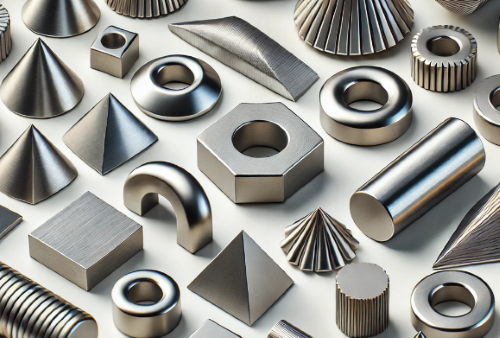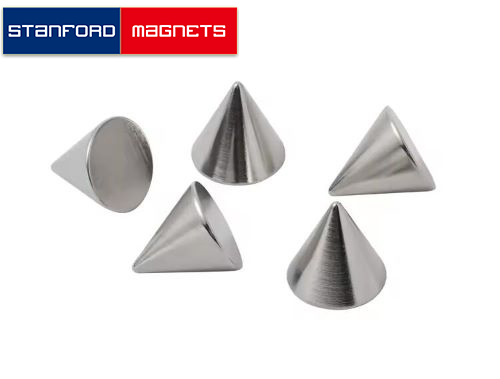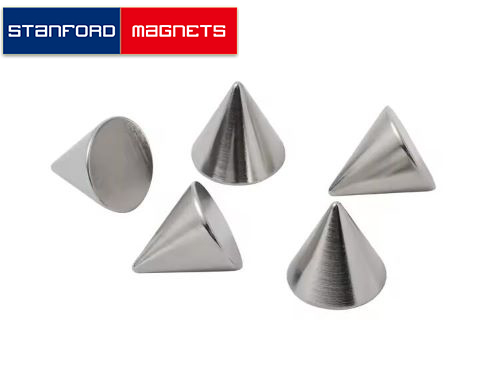Main Types of Non-Standard Shaped Magnets
Introduction
Magnets come in a wide variety of shapes and sizes, each designed for specific applications. While standard shapes like rectangles, discs, and cylinders are more common, there is a growing demand for non-standard shaped magnets in specialized industries.
Non-standard magnets, such as trapezoidal, conical, and drum-shaped magnets, offer unique properties that make them highly suitable for specific uses. In this article, we’ll explore the main types of non-standard shaped magnets, their applications, and the benefits they provide.

1. Trapezoidal Magnets
Trapezoidal magnets are designed with a narrow top and a wide base, resembling the shape of a trapezoid. This unique geometry allows them to be used in specific assemblies where standard shapes would be less effective.
One common application of trapezoidal magnets is in motors and turbines. Their shape helps create a more uniform magnetic field and allows for smoother operation in rotating machinery.
Trapezoidal magnets can also be tailored to fit into custom spaces, improving efficiency.
2. Conical Magnets
Conical magnets have a cone shape, with one end being significantly larger than the other. This shape provides a concentrated magnetic force at the smaller end of the cone. These magnets are particularly useful in applications where a focused magnetic field is required.
Conical magnets are commonly used in medical devices and research instruments where precision is crucial. Their tapered design makes them ideal for applications that require precise targeting of magnetic fields, such as in magnetic resonance imaging (MRI) or in magnetic particle separation equipment. Additionally, their unique shape allows for easier integration into tight spaces or irregular surfaces.

3. Drum-Shaped Magnets
Drum-shaped magnets are cylindrical but with a flat face and rounded sides, making them resemble a drum. This design offers uniform magnetic force over a large surface area, which is highly desirable in applications that need stable and evenly distributed magnetic power.
Drum-shaped magnets are often found in industrial equipment, such as conveyor belts and magnetic separators. Their shape makes them particularly effective in attracting and holding onto ferromagnetic materials.
This is why they are commonly used in recycling plants, mining operations, and bulk material handling systems. The ability of drum-shaped magnets to maintain a strong magnetic field over an extended area helps improve operational efficiency and reduces downtime by ensuring consistent separation of magnetic materials.
Applications of Non-Standard Shaped Magnets
Non-standard shaped magnets are widely used in specialized industries due to their tailored designs. These magnets can be found in:
- Medical Devices: Conical magnets are frequently used in medical imaging devices and other precision instruments where targeted magnetic fields are needed. Their ability to focus magnetic energy in a specific direction makes them indispensable in fields like diagnostic imaging and biomedical research.
- Electric Motors and Generators: Trapezoidal magnets are commonly used in electric motors, particularly in electric vehicles, to create more efficient magnetic fields. Their shape allows for smoother and more efficient energy conversion, improving motor performance.
- Industrial Machinery: Drum-shaped magnets are widely used in industrial settings such as mining and material handling. They help to separate magnetic materials from non-magnetic ones in a wide range of processes, including recycling and ore processing.
- Aerospace and Defense: Non-standard shaped magnets are often used in specialized aerospace and defense applications where compact and efficient magnetic solutions are required.
Benefits of Non-Standard Shaped Magnets
One of the biggest advantages of non-standard shaped magnets is their ability to be customized for specific needs. Standard magnets often have limitations when it comes to fitting into unique designs or spaces. In contrast, non-standard magnets are designed to enhance magnetic performance while conforming to the physical requirements of the application.
Stanford Magnets has extensive experience in manufacturing magnets of various shapes and sizes, including trapezoidal, conical, and drum-shaped designs. We specialize in providing custom magnetic solutions tailored to meet the specific needs of each application. Whether you’re looking for enhanced magnetic performance or a unique shape to fit a particular space, our team can offer expert guidance. If you’re interested, please send us your specifications, and we’ll be happy to assist you.
Conclusion
Non-standard shaped magnets, such as trapezoidal, conical, and drum-shaped magnets, play a critical role in various industries. Their unique shapes allow for optimized magnetic performance, improved efficiency, and enhanced versatility in specialized applications. Whether it’s improving motor efficiency, enabling precision in medical devices, or optimizing industrial machinery, these magnets are indispensable in modern technology.
